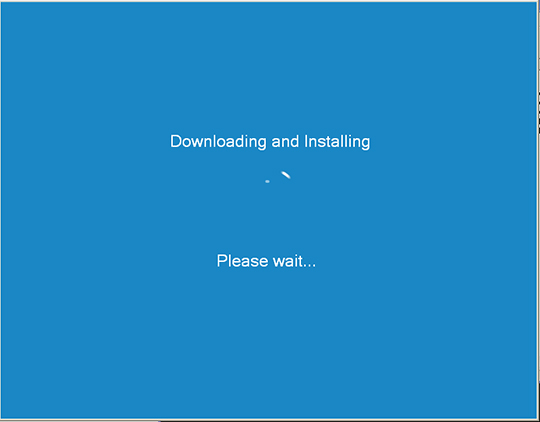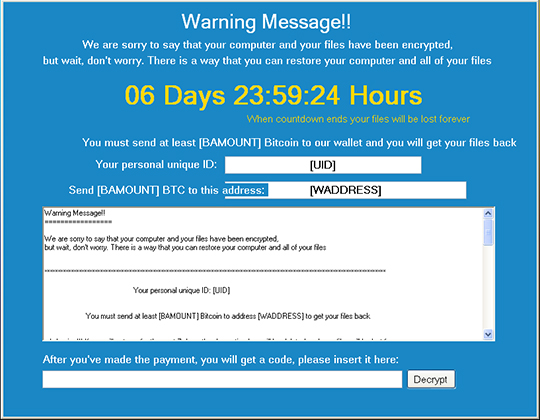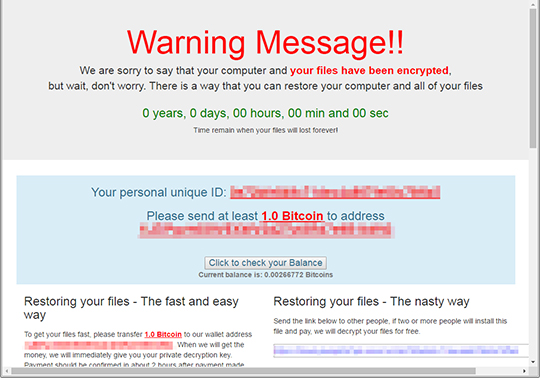RANSOM_POPCORNTYM.A
Trojan-Dropper.Win32.Dapato.opik (Kaspersky), Ransom:Win32/Genasom!rfn (Microsoft), a variant of MSIL/Filecoder.PopcornTime.A (ESET-NOD32)
Windows


Threat Type: Trojan
Destructiveness: No
Encrypted: Yes
In the wild: Yes
OVERVIEW
This Trojan arrives on a system as a file dropped by other malware or as a file downloaded unknowingly by users when visiting malicious sites. It may be manually installed by a user.
It connects to certain websites to send and receive information.
TECHNICAL DETAILS
Arrival Details
This Trojan arrives on a system as a file dropped by other malware or as a file downloaded unknowingly by users when visiting malicious sites.
It may be manually installed by a user.
Installation
This Trojan drops the following files:
- %Application Data%\if_delete_you_lose_your_files.txt ← contains identifier
- %Application Data%\server_step_one
- %Application Data%\time_file_name
(Note: %Application Data% is the Application Data folder, where it usually is C:\Documents and Settings\{user name}\Application Data on Windows 2000, Windows Server 2003, and Windows XP (32- and 64-bit); C:\Users\{user name}\AppData\Roaming on Windows Vista (32- and 64-bit), Windows 7 (32- and 64-bit), Windows 8 (32- and 64-bit), Windows 8.1 (32- and 64-bit), Windows Server 2008, and Windows Server 2012.)
Autostart Technique
This Trojan adds the following registry entries to enable its automatic execution at every system startup:
HKEY_CURRENT_USER\Software\Microsoft\
Windows\CurrentVersion\Run
Popcorn_Time = {malware path and filename}
Other Details
This Trojan connects to the following website to send and receive information:
- http://{BLOCKED}orn-time-free.net/app/server/images/set/{identifier}.jpg?c={random number}
It encrypts files with the following extensions:
- .1cd
- .3dm
- .3ds
- .3fr
- .3g2
- .3gp
- .3pr
- .7z
- .7zip
- .aac
- .aaf
- .ab4
- .accdb
- .accde
- .accdr
- .accdt
- .ach
- .acr
- .act
- .adb
- .adp
- .ads
- .aep
- .aepx
- .aes
- .aet
- .agdl
- .ai
- .aif
- .aiff
- .ait
- .al
- .amr
- .aoi
- .apj
- .apk
- .arch00
- .arw
- .as
- .as3
- .asf
- .asm
- .asp
- .aspx
- .asset
- .asx
- .atr
- .avi
- .awg
- .back
- .backup
- .backupdb
- .bak
- .bar
- .bay
- .bc6
- .bc7
- .bdb
- .bgt
- .big
- .bik
- .bin
- .bkf
- .bkp
- .blend
- .blob
- .bmd
- .bmp
- .bpw
- .bsa
- .c
- .cas
- .cdc
- .cdf
- .cdr
- .cdr3
- .cdr4
- .cdr5
- .cdr6
- .cdrw
- .cdx
- .ce1
- .ce2
- .cer
- .cfg
- .cfr
- .cgm
- .cib
- .class
- .cls
- .cmt
- .config
- .contact
- .cpi
- .cpp
- .cr2
- .craw
- .crt
- .crw
- .cs
- .csh
- .csl
- .css
- .csv
- .d3dbsp
- .dac
- .dar
- .das
- .dat
- .dazip
- .db
- .db0
- .db3
- .db_journal
- .dba
- .dbf
- .dbx
- .dc2
- .dcr
- .dcs
- .ddd
- .ddoc
- .ddrw
- .dds
- .der
- .des
- .desc
- .design
- .dgc
- .dir
- .dit
- .djvu
- .dmp
- .dng
- .doc
- .docb
- .docm
- .docx
- .dot
- .dotm
- .dotx
- .drf
- .drw
- .dtd
- .dwg
- .dxb
- .dxf
- .dxg
- .easm
- .edb
- .efx
- .eml
- .epk
- .eps
- .erbsql
- .erf
- .esm
- .exf
- .fdb
- .ff
- .ffd
- .fff
- .fh
- .fhd
- .fla
- .flac
- .flf
- .flv
- .flvv
- .forge
- .fos
- .fpk
- .fpx
- .fsh
- .fxg
- .gdb
- .gdoc
- .gho
- .gif
- .gmap
- .gray
- .grey
- .groups
- .gry
- .gsheet
- .h
- .hbk
- .hdd
- .hkdb
- .hkx
- .hplg
- .hpp
- .htm
- .html
- .hvpl
- .ibank
- .ibd
- .ibz
- .icxs
- .idml
- .idx
- .iff
- .iif
- .iiq
- .incpas
- .indb
- .indd
- .indl
- .indt
- .inx
- .itdb
- .itl
- .itm
- .iwd
- .iwi
- .jar
- .java
- .jnt
- .jpe
- .jpeg
- .jpg
- .js
- .kc2
- .kdb
- .kdbx
- .kdc
- .key
- .kf
- .kpdx
- .kwm
- .laccdb
- .layout
- .lbf
- .lck
- .ldf
- .lit
- .litemod
- .log
- .lrf
- .ltx
- .lua
- .lvl
- .m
- .m2
- .m2ts
- .m3u
- .m3u8
- .m4a
- .m4p
- .m4u
- .m4v
- .map
- .max
- .mbx
- .mcmeta
- .md
- .mdb
- .mdbackup
- .mdc
- .mddata
- .mdf
- .mdi
- .mef
- .menu
- .mfw
- .mid
- .mkv
- .mlb
- .mlx
- .mmw
- .mny
- .mos
- .mov
- .mp3
- .mp4
- .mpa
- .mpeg
- .mpg
- .mpp
- .mpqge
- .mrw
- .mrwref
- .msg
- .myd
- .nc
- .ncf
- .nd
- .ndd
- .ndf
- .nef
- .nk2
- .nop
- .nrw
- .ns2
- .ns3
- .ns4
- .nsd
- .nsf
- .nsg
- .nsh
- .ntl
- .nvram
- .nwb
- .nx2
- .nxl
- .nyf
- .oab
- .obj
- .odb
- .odc
- .odf
- .odg
- .odm
- .odp
- .ods
- .odt
- .ogg
- .oil
- .orf
- .ost
- .otg
- .oth
- .otp
- .ots
- .ott
- .p12
- .p7b
- .p7c
- .pab
- .pages
- .pak
- .pas
- .pat
- .pcd
- .pct
- .pdb
- .pdd
- .pef
- .pem
- .pfx
- .php
- .pif
- .pkpass
- .pl
- .plb
- .plc
- .plt
- .plus_muhd
- .pmd
- .png
- .po
- .pot
- .potm
- .potx
- .ppam
- .ppj
- .ppk
- .pps
- .ppsm
- .ppsx
- .ppt
- .pptm
- .pptx
- .prel
- .prf
- .prproj
- .ps
- .psafe3
- .psd
- .psk
- .pst
- .ptx
- .pwm
- .py
- .qba
- .qbb
- .qbm
- .qbr
- .qbw
- .qbx
- .qby
- .qcow
- .qcow2
- .qdf
- .qed
- .qic
- .r3d
- .ra
- .raf
- .rar
- .rat
- .raw
- .rb
- .rdb
- .re4
- .rgss3a
- .rim
- .rm
- .rofl
- .rtf
- .rvt
- .rw2
- .rwl
- .rwz
- .s3db
- .safe
- .sas7bdat
- .sav
- .save
- .say
- .sb
- .sd0
- .sda
- .sdf
- .ses
- .shx
- .sid
- .sidd
- .sidn
- .sie
- .sis
- .sldasm
- .sldblk
- .sldm
- .sldprt
- .sldx
- .slm
- .snx
- .sql
- .sqlite
- .sqlite3
- .sqlitedb
- .sr2
- .srf
- .srt
- .srw
- .st4
- .st5
- .st6
- .st7
- .st8
- .stc
- .std
- .sti
- .stl
- .stm
- .stw
- .stx
- .sum
- .svg
- .swf
- .sxc
- .sxd
- .sxg
- .sxi
- .sxm
- .sxw
- .syncdb
- .t12
- .t13
- .tap
- .tax
- .tex
- .tga
- .thm
- .tif
- .tlg
- .tor
- .txt
- .upk
- .v3d
- .vbox
- .vcf
- .vdf
- .vdi
- .vfs0
- .vhd
- .vhdx
- .vmdk
- .vmsd
- .vmx
- .vmxf
- .vob
- .vpk
- .vpp_pc
- .vtf
- .w3x
- .wab
- .wad
- .wallet
- .wav
- .wb2
- .wma
- .wmo
- .wmv
- .wotreplay
- .wpd
- .wps
- .x11
- .x3f
- .xf
- .xis
- .xla
- .xlam
- .xlk
- .xll
- .xlm
- .xlr
- .xls
- .xlsb
- .xlsb3dm
- .xlsm
- .xlsx
- .xlt
- .xltm
- .xltx
- .xlw
- .xml
- .xqx
- .xxx
- .ycbcra
- .yuv
- .zip
- .ztmp
It renames encrypted files using the following names:
- {filename}.{ext}.kok
- {filename}.{ext}.filock
NOTES:
Once executed, this ransomware will display the following fake download screen. However, this malware is actually encrypting files in the background:

It will also display the following window that contains the warning message:

It will drop the following ransom note:

It will delete files whenever the user tries to enter wrong decryption code.
SOLUTION
Step 1
Before doing any scans, Windows XP, Windows Vista, and Windows 7 users must disable System Restore to allow full scanning of their computers.
Step 2
Identify and terminate files detected as RANSOM_POPCORNTYM.A
- Windows Task Manager may not display all running processes. In this case, please use a third-party process viewer, preferably Process Explorer, to terminate the malware/grayware/spyware file. You may download the said tool here.
- If the detected file is displayed in either Windows Task Manager or Process Explorer but you cannot delete it, restart your computer in safe mode. To do this, refer to this link for the complete steps.
- If the detected file is not displayed in either Windows Task Manager or Process Explorer, continue doing the next steps.
Step 3
Delete this registry value
Important: Editing the Windows Registry incorrectly can lead to irreversible system malfunction. Please do this step only if you know how or you can ask assistance from your system administrator. Else, check this Microsoft article first before modifying your computer's registry.
- In HKEY_CURRENT_USER\Software\Microsoft\Windows\CurrentVersion\Run
- Popcorn_Time = {malware path and filename}
- Popcorn_Time = {malware path and filename}
Step 4
Search and delete this file
Step 5
Scan your computer with your Trend Micro product to delete files detected as RANSOM_POPCORNTYM.A. If the detected files have already been cleaned, deleted, or quarantined by your Trend Micro product, no further step is required. You may opt to simply delete the quarantined files. Please check this Knowledge Base page for more information.
Step 6
Restore encrypted files from backup.
Did this description help? Tell us how we did.


